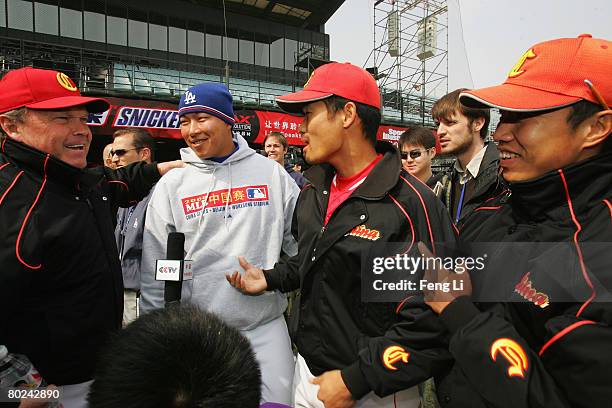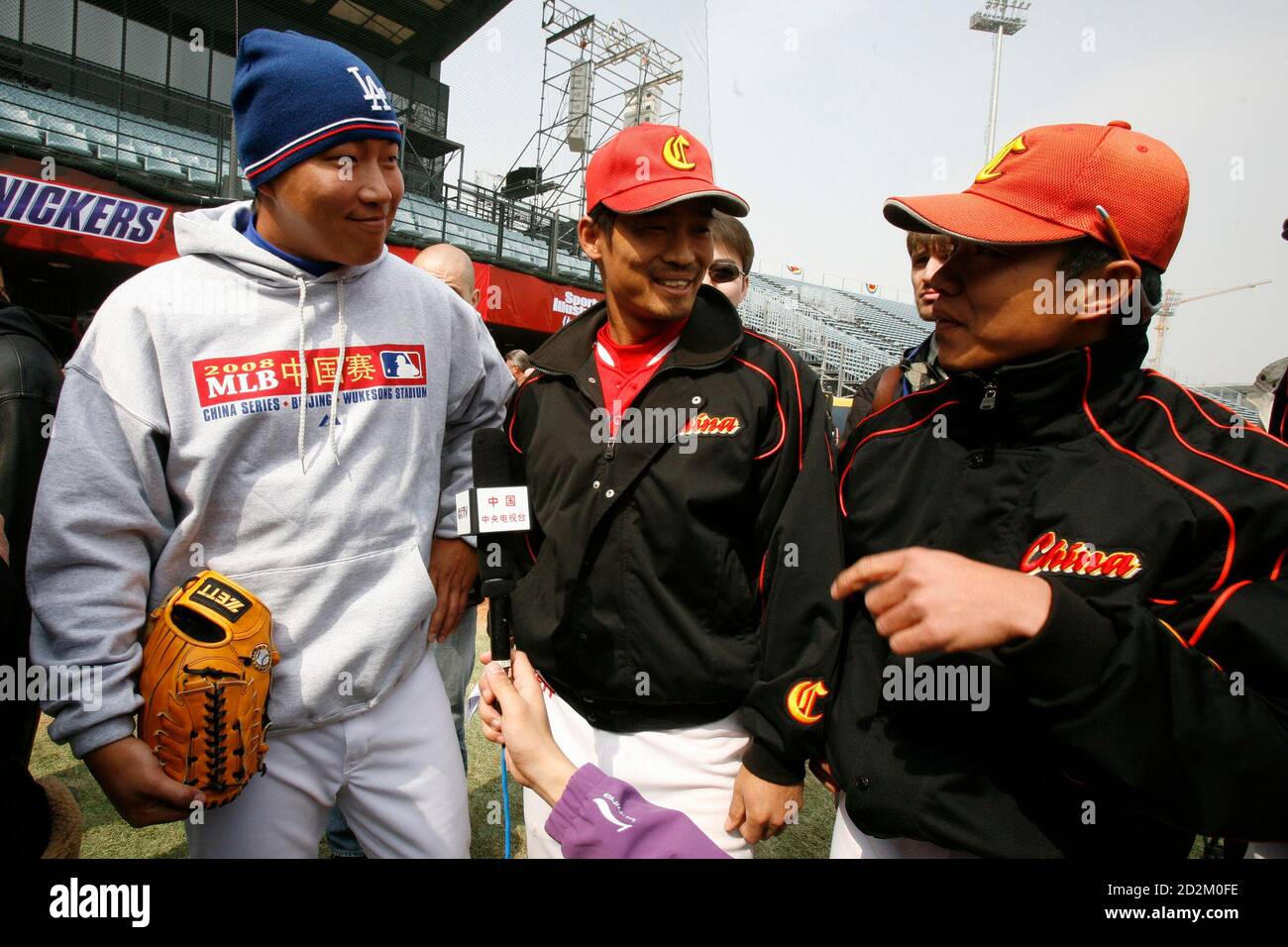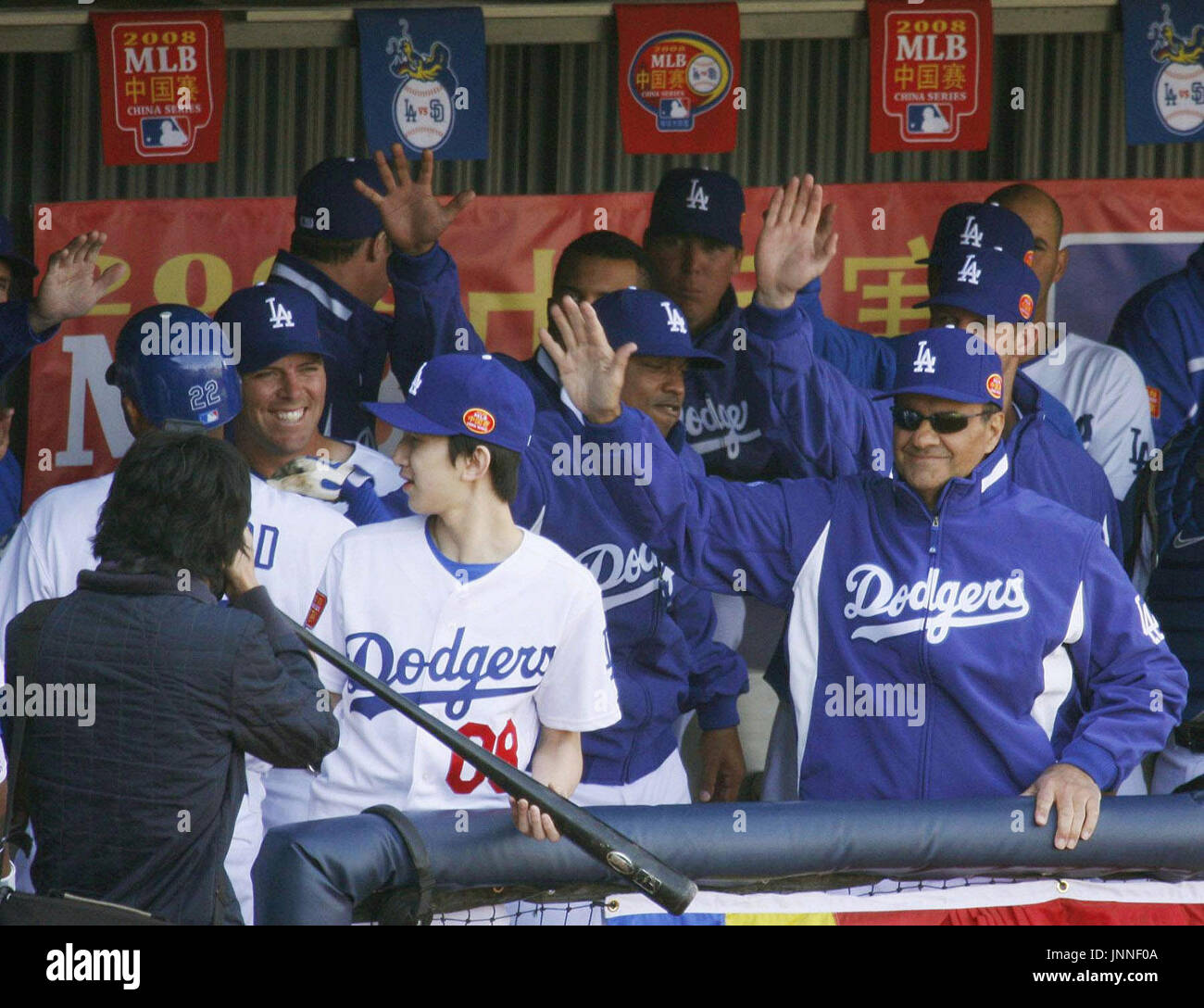Many baseball fans, especially those who follow the Los Angeles Dodgers, often wonder about the diverse backgrounds of the players on their favorite team. It's a natural curiosity, really, to think about where athletes come from and the unique stories they bring to the field. People are often keen to learn about players from different parts of the world, and that includes wondering if there's a Chinese baseball player currently with the Dodgers. It's a pretty specific question, and one that, you know, sparks a lot of interest among those who love the game.
The search for a Chinese player on the Dodgers is, in a way, part of a larger conversation about the global reach of baseball and the growing presence of athletes from various nations in major leagues. It makes perfect sense that someone would ask this, especially with the increasing attention on player development across the globe. You might be looking for a specific name, or perhaps just curious about the possibility, which is totally understandable.
However, it's worth noting right from the start that the information we have at hand, our text, actually focuses on broader aspects of Chinese culture, language, and history. While it gives us a really interesting look into what it means to be "Chinese" and some historical insights, it doesn't, unfortunately, mention any specific baseball players, especially not one on the Dodgers. So, while we can explore the rich background of Chinese identity, the direct answer to "Who is the Chinese baseball player on the Dodgers?" isn't something our current information covers.
Table of Contents
- Understanding the Search for a Chinese Dodgers Player
- What Our Information Reveals About Chinese People and Language
- A Glimpse into Chinese History: Pingyao Ancient City
- Learning More About Chinese Culture and Language
- Common Questions About Chinese Players and Culture
Understanding the Search for a Chinese Dodgers Player
When someone asks, "Who is the Chinese baseball player on the Dodgers?", they are, quite clearly, looking for specific information about a particular athlete. This kind of question suggests a desire to connect with players who share a cultural background, or perhaps just to understand the team's diverse makeup a little better. It's a very direct query, and, you know, it aims for a clear answer. However, the text we're working with, as we've mentioned, doesn't actually provide any names or details about a baseball player associated with the Dodgers or any other team. It focuses on the broader concept of "Chinese" in terms of language, people, and a historical location, which is, in a way, a different kind of insight.
So, while the question itself is very specific, our source material leads us to explore the foundational elements of what "Chinese" means. It's almost like asking about a specific type of car, and then being given details about how engines generally work, or the history of roads. It's related, but not the direct answer you might be looking for. This article will, therefore, look at the rich cultural tapestry that the term "Chinese" represents, drawing solely from the provided text, rather than identifying a specific athlete. It's important to set that expectation right away, as a matter of fact.
The interest in a Chinese baseball player is, arguably, part of a global trend where sports leagues are becoming more and more international. Fans enjoy seeing representation from various countries, and baseball, too, has seen players from many different nations join its ranks over the years. This particular query about a Chinese player on the Dodgers highlights that growing global perspective. However, without direct information from our given text, we can only discuss the background elements related to the Chinese identity as presented to us.
What Our Information Reveals About Chinese People and Language
Our reference text, you see, offers a really interesting perspective on what "Chinese" actually means. It starts by telling us that 'Chinese writing' is, in fact, a group of languages. This is a pretty important distinction, as many people might think of "Chinese" as just one single language. But, as the text clarifies, it's more like a family of languages, which are popularly called dialects, but they are, technically, distinct varieties. This gives us a much richer picture of the linguistic landscape, you know?
The text then moves on to define "Chinese people." It says they are, simply, people or ethnic groups identified with China. This identification can happen in various ways, such as through ethnicity, nationality, citizenship, or some other affiliation. So, it's not just one narrow definition, which is pretty broad, actually. This means that someone identified as Chinese could come from many different backgrounds, all connected to China in some way, shape, or form.
The Richness of Chinese Languages
The Chinese language itself is described as the group of languages used by Chinese people both within China and in other parts of the world. This is a vast linguistic system, to be sure. Our text specifically mentions Mandarin language as the most widely spoken form of Chinese. Mandarin Chinese, it explains, is spoken in all of China north of the Yangtze River, and also in much of the rest of the country. This really highlights its widespread use, doesn't it?
But, you know, it's not just Mandarin. The text also acknowledges that there are regional dialects. This is a key point, as it shows the incredible linguistic diversity within China. From Mandarin to Yue, the text encourages us to explore all about the Chinese language and its various dialects. This suggests a really deep and varied linguistic heritage, which is quite fascinating, honestly. It's not a single, uniform language, but a collection of related, yet distinct, ways of speaking.
For anyone interested in learning, the text even mentions resources like the "Best channel to learn conversational Chinese" and "Free online Mandarin Chinese course." It also points out "New Mandarin Chinese lesson every Sunday!💬🎥📲💻🎧 please subscribe for pinyin, Mandarin Chinese tone." This really emphasizes the accessibility of learning these languages now, which is pretty cool. It suggests a global interest in Chinese language, which, in a way, mirrors the global interest in sports and players from diverse backgrounds.
Defining "Chinese People"
The concept of "Chinese people" is, as our text suggests, quite broad. It encompasses individuals and ethnic groups who have a connection to China, whether that's through their heritage, their nationality, or even their citizenship. This means that a person identified as Chinese could come from various places and backgrounds, all sharing a common link to China. This broad definition is, in some respects, important when considering any individual of Chinese background, whether they are a baseball player or someone else entirely.
This wide scope of identity means that when we think about a "Chinese baseball player," we're not just talking about someone from one specific place or with one specific story. Instead, it opens up the possibility of many different stories, all linked by this shared identification with China. It's a very inclusive definition, actually, which is pretty neat. This perspective helps us appreciate the diverse paths individuals take, even if our current text doesn't provide specific names.
A Glimpse into Chinese History: Pingyao Ancient City
While our core question is about a baseball player, the provided text takes a fascinating detour into Chinese history by describing Pingyao Ancient City. This is, you know, a really significant historical site that gives us a sense of the deep cultural roots associated with Chinese identity. It's a small city, actually, whose old town is on the UNESCO World Heritage list, located in Shanxi Province, China. This fact alone tells you it's a place of considerable importance.
Pingyao, also known as Ping Yao, is a famous ancient city situated in Jinzhong, Shanxi province, in northern China, approximately 600km from Beijing. It has a history spanning 2700 years, which is just incredible to think about. Back to its history, Pingyao Ancient City is, as the text says, a great witness with 2700 years of history. It was founded in the Western Zhou Dynasty in the 8th century BC, and then, later on, it got extensions during the Ming and Qing Dynasties. This shows a long, continuous story of development and survival.
Pingyao's Enduring Legacy
Up to now, Pingyao has, remarkably, survived from wars and modernization. It's still being an incredibly well-preserved example of ancient urban planning and architectural styles. Its urban fabric, you see, truly shows the evolution of architectural styles and town planning over centuries. This enduring quality is a testament to its historical significance and the efforts made to preserve it. The text even states that Pingyao's old town is typically considered the best preserved, which is a pretty high compliment.
With an area of 10,000 square yards (8,361 square meters), it is described as the best preserved Confucius Temple in China. This adds another layer of cultural importance to the city, connecting it to one of China's most influential philosophical figures. Compared to bustling metropolises like Beijing and Xi'an, with their multiple urban districts, Pingyao China is like a small fish in a big pond. However, the text quickly adds, "don't let its size fool you." This little city holds immense historical and cultural value, proving that size isn't everything when it comes to significance.
Experiencing Pingyao Today
The text also offers a little advice for visiting Pingyao, suggesting that trying to see it all in one day often feels rushed, and you'll probably miss some of the most interesting spots. This implies that the city has a lot to offer, more than meets the eye initially. It's a place that invites exploration and a deeper look, which is pretty cool. This guide, the text hints, will show you exactly how to make the most of your time there, which is helpful for anyone planning a visit.
So, while Pingyao doesn't directly answer our baseball question, it gives us a really strong sense of the historical depth and cultural richness that defines "Chinese." It reminds us that behind any individual, there's often a long and fascinating history. This ancient city, with its enduring structures and stories, is a powerful symbol of the heritage that connects people identified with China, which, in a way, is pretty special.
Learning More About Chinese Culture and Language
Our text, you know, really emphasizes the importance and accessibility of learning about Chinese language and culture. It points out that there are "good reasons to study Chinese," and asks if you "know the Chinese language comes in" various forms. This encourages a deeper look beyond just the surface. It’s pretty clear that understanding the language is a key part of connecting with the culture.
For example, the mention of a "Free online Mandarin Chinese course" and "New Mandarin Chinese lesson every Sunday!" suggests that resources are readily available for anyone interested in picking up the language. Learning about pinyin and Mandarin Chinese tones is highlighted, which are fundamental aspects of the language. This focus on education and accessibility is, in a way, quite welcoming for new learners.
The phrase "From Mandarin to Yue, explore all about the Chinese language & dialects" further underscores the diversity within Chinese languages. It’s not just one uniform language, but a whole family of them, each with its own unique characteristics. This depth means there's a lot to discover for anyone interested, which is pretty neat. This kind of exploration, you know, can really broaden one's understanding of Chinese identity, even if it doesn't directly lead to a specific baseball player.
It’s almost like the text is gently guiding us to understand the vastness of Chinese culture, which, in turn, helps us appreciate the background of any individual of Chinese heritage, whether they are involved in sports or other fields. The emphasis on learning and exploration shows a path to deeper appreciation, which is a rather nice touch.
Common Questions About Chinese Players and Culture
Here are some common questions people might have, based on the query about a Chinese baseball player and the information provided in our text:
Is there a Chinese player on the Dodgers right now?
Based on the text provided, there is no specific information about a Chinese baseball player currently on the Dodgers roster. The text focuses on defining "Chinese" in terms of language and people, and also describes the historical city of Pingyao. It doesn't, you know, provide any details about specific athletes or sports teams.
What is the connection between China and baseball?
Our given text doesn't specifically detail the connection between China and the sport of baseball. It discusses Chinese languages, people, and historical sites like Pingyao Ancient City. While it highlights the global presence of Chinese people and language, it doesn't, in a way, elaborate on their involvement in professional baseball. The text focuses more on cultural and linguistic aspects, rather than sports affiliations.
Where can I learn more about Chinese culture?
If you're looking to learn more about Chinese culture, our text offers a few interesting avenues. It mentions resources for learning Mandarin Chinese, such as "Best channel to learn conversational Chinese" and "Free online Mandarin Chinese course." It also provides details about Pingyao Ancient City, a UNESCO World Heritage site with a 2700-year history, which is a really great example of ancient Chinese urban planning and architecture. So, you know, these are good starting points for cultural exploration. Learn more about Chinese language and culture on our site, and link to this page for more historical insights.
Related Resources:



Detail Author:
- Name : Clemmie Lebsack
- Username : dare.electa
- Email : vvonrueden@nitzsche.com
- Birthdate : 1983-08-15
- Address : 837 Marisa Mountains Apt. 497 New Pearl, ID 54112
- Phone : 1-315-901-1485
- Company : Ryan PLC
- Job : Lodging Manager
- Bio : Deleniti sit rem modi. Reprehenderit molestias vero perferendis quasi incidunt occaecati itaque. Dolorem eos et quam voluptatum modi. Est eveniet ut veritatis occaecati blanditiis.
Socials
instagram:
- url : https://instagram.com/elizabeth_wisozk
- username : elizabeth_wisozk
- bio : Amet ab est explicabo. Hic et harum ut dolorem. Cupiditate dicta id nostrum.
- followers : 1521
- following : 904
twitter:
- url : https://twitter.com/elizabethwisozk
- username : elizabethwisozk
- bio : Voluptas inventore eos quis ipsam iure rem facere ut. Et ullam aliquam quisquam eveniet non nobis quo at. Voluptates est ad fuga ut. Et sit aperiam et sed.
- followers : 342
- following : 705
facebook:
- url : https://facebook.com/elizabeth8893
- username : elizabeth8893
- bio : Ex et inventore quam quia vitae qui ea qui.
- followers : 1298
- following : 556
linkedin:
- url : https://linkedin.com/in/wisozk1996
- username : wisozk1996
- bio : Fugit natus fugiat fugiat.
- followers : 2512
- following : 1401